Law Day 2015
It’s May 1, officially declared as Law Day in the United States,1 and for this self-proclaimed law geek it’s definitely my kind of holiday.
 Law Day as a day to celebrate the rule of law and its role in creating and protecting American freedoms was first recognized in 1957 with a proclamation by President Dwight D. Eisenhower. In 1961, a joint resolution of Congress called for an annual proclamation of Law Day, and this year’s proclamation can be found here.
Law Day as a day to celebrate the rule of law and its role in creating and protecting American freedoms was first recognized in 1957 with a proclamation by President Dwight D. Eisenhower. In 1961, a joint resolution of Congress called for an annual proclamation of Law Day, and this year’s proclamation can be found here.
Each year the American Bar Association chooses a different theme for Law Day. And for 2015, it’s Magna Carta: Symbol of Freedom Under Law.2
The Magna Carta. Written 800 years ago this year. Forced on a King by his barons when he seemed to be ignoring their rights — and the rights of all people — under the law.
Much of what was written in the Magna Carta — in England in the year 1215 — seems to have little application to us here — generations away in the 21st century and an ocean away in the United States.
But some of it still forms the fundamental foundation of our laws:
• “In future no official shall place a man on trial upon his own unsupported statement, without producing credible witnesses to the truth of it.”3
• “No free man shall be seized or imprisoned, or stripped of his rights or possessions, or outlawed or exiled, or deprived of his standing in any other way, nor will we proceed with force against him, or send others to do so, except by the lawful judgement of his equals or by the law of the land.”4
• “To no one will we sell, to no one deny or delay right or justice.”5
And we can see its effects in the earliest elements of our laws.
Just as one example, since The Legal Genealogist is winging off to Atlanta today, to join the Georgia Genealogical Society at tomorrow’s “Your Ancestors and the Law” conference, consider the 1777 Georgia Constitution. Here are some of the provisions of that document that might not exist, but for the Magna Carta:
ART. LI. Estates shall not be entailed; and when a person dies intestate, his or her estate shall be divided equally among their children; the widow shall have a child’s share, or her dower, at her option; all other intestates’ estates to be divided according to the act of distribution, made in the reign of Charles the Second, unless otherwise altered by any future act of the legislature.
ART. LIV. Schools shall be erected in each county, and supported at the general expense of the State, as the legislature shall hereafter point out.
ART. LVI. All persons whatever shall have the free exercise of their religion; provided it be not repugnant to the peace and safety of the State; and shall not, unless by consent, support any teacher or teachers except those of their own profession.
ART. LIX. Excessive fines shall not be levied, not excessive bail demanded.
ART. LX. The principles of the habeas-corpus act shall be a part of this constitution.
ART. LXI. Freedom of the press and trial by jury to remain inviolate forever.6
In short, much of what we are as a nation — much of the law we have — much of the record base we have because of the law — can be traced back to the Magna Carta.
And that, to this genealogist, is worth celebrating.
Happy Law Day 2015!
SOURCES
- See 36 U.S.C. §113 ↩
- See “Law Day: Research Guide,” Library of Congress (http://www.loc.gov/ : accessed 30 Apr 2015). See also American Bar Association, “Law Day 2015” (http://www.americanbar.org : accessed 30 Apr 2015). ↩
- Magna Carta, paragraph 38; translation, “The Text of Magna Carta,” Fordham University Internet History Sourcebooks Project (http://legacy.fordham.edu/Halsall/index.asp : accessed 30 Apr 2015). ↩
- Ibid., paragraph 39. ↩
- Ibid., paragraph 40. ↩
- Georgia Constitution of 1777, in Francis Newton Thorpe, The Federal and State Constitutions Colonial Charters, and Other Organic Laws of the States (Washington, D.C. : Govt. Printing Office, 1909), II: 777, 784-785; digital images, Google Books (http://books.google.com : accessed 30 Apr 2015). ↩



I thought the Museum of Fine Arts exhibition featuring the Magna Carta last year did a great job tying it in to American burgeoning legal tradition. In particular, they featured many artifacts regarding the American Revolution (most on loan from the Massachusetts Historical Society) and a portrait of Paul Cuffee (on loan from NEHGS), a very successful African-American businessman & whaling captain who was amongst those who petitioned the Massachusetts legislature in 1780 for “having No vote on Influence in the Election with those that tax us” because they were of African descent.
Their page on their exhibition is still up at http://www.mfa.org/exhibitions/magna-carta
And as with all rulers in power, they scoff at the law unless enforced by the people. The Magna Carta, our Bill of Rights and our Constitution are sacred to our American way. Our forefathers fought hard and took great risks, I hope through constant vigilance we keep these powers in check. History it seems just keeps trying to create another King John.